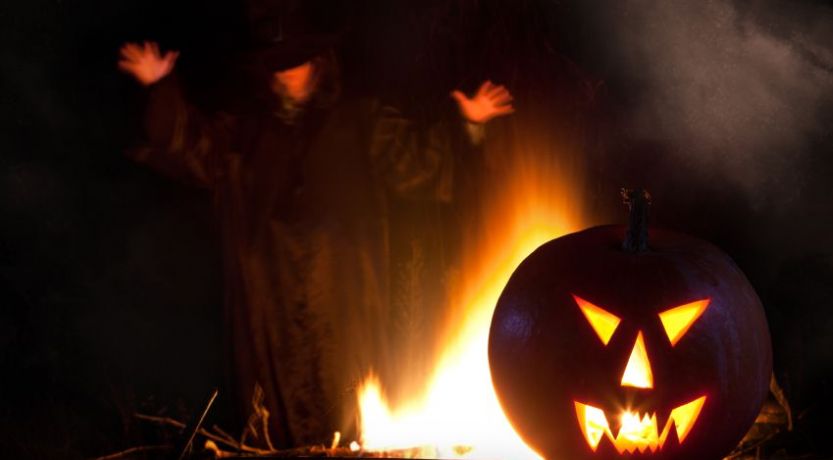Where did Halloween and its dark and demonic themes come from? What is its relationship to All Saints’ Day, and should Christians celebrate Halloween?

Should Christians celebrate Halloween?
Costumes. Horror movies. Trick-or-treating. Candy. Haunted houses.
These are all traditions that are associated with Halloween. It’s a holiday that focuses heavily on dark themes of death, ghosts and horror.
Halloween, with its dark and demonic themes, seems an unlikely holiday for Christians to celebrate. Yet it has become increasingly popular in America and other countries, marketed as a harmless dress-up night for kids and an excuse to party for adults.
Unless you’re a devout Catholic, you may be less familiar with the day that comes immediately after Halloween on Nov. 1: All Saints’ Day.
Why did two days that focus on celebrating and honoring the dead come to fall on Oct. 31 and Nov. 1? And, more importantly, should you have anything to do with these holidays?
From Samhain to Halloween and All Saints’ Day
It is widely understood that Halloween and All Saints’ Day have their origins in an ancient Celtic festival called Samhain (pronounced sah-win). As the warm summer days (associated with life) gave way to the cold of autumn and winter (associated with death), the Celts believed the division between life and death was blurred. They believed that on Nov. 1 (the Celtic new year) the spirits of the dead roamed the earth.
Some people would light bonfires to repel the evil spirits and wear masks “to confuse the spirits and stop the dead [from] identifying individuals who they had disliked during their own lifetime” (“The Origin of Halloween Lies in Celtic Ireland”). Some would leave food outside for the wandering evil spirits—in order to placate them and keep them from causing mischief for the living. Others would try to communicate with their dead relatives and friends through séances.
It is widely understood that Halloween and All Saints’ Day have their origins in an ancient Celtic festival called Samhain.
When the Romans conquered the British Isles in the first century, they began to merge some of their autumn festivals with Samhain—including Feralia, which celebrated the spirits of the dead. The common denominator in these celebrations was death. Because leaves and vegetation “died” for the winter, ancient pagans associated this season with the theme of death.
Origin of Halloween
The World Book Encyclopedia summed it up this way:
The Celtic festival of Samhain is probably the source of the present-day Halloween celebration. The Celts lived more than 2,000 years ago in what is now Great Britain, Ireland, and northern France. Their new year began on November 1. A festival that began the previous evening honored Samhain, the Celtic lord of death. The celebration marked the beginning of the season of cold, darkness, and decay. It naturally became associated with human death. The Celts believed that Samhain allowed the souls of the dead to return to their earthly homes for this evening” (1990, article “Halloween”).
It seems costumes of animal heads and skins played a part in their celebration, as well as fortune telling using the remains of the animals that were sacrificed. So how did this gory pagan holiday become associated with Christianity?
“Many of the customs of the Celts survived even after the people became Christians. During the 800’s, the church established All Saints’ Day on November 1. … The people made the old pagan customs part of this Christian holy day” (ibid.).
Pagan festivals absorbed into Christianity
After Christianity was introduced to the Irish in the fourth century, the ancient Celtic and Druid traditions were either abandoned or absorbed into the Roman Christianity adopted by the people. That is what happened to Samhain.
In the eighth century the Roman Church, under Pope Gregory III, moved All Saints’ Day from May 13 to Nov. 1 (the day previously celebrated as Samhain). The thinking was that establishing the day to honor dead saints (through masses, prayers and relics) on top of a pagan day to honor the dead would help ease people out of celebrating Samhain. The same reasoning was used for other holidays like Christmas, Easter and Valentine’s Day—all of which occupy dates that were previously prominent pagan festivals.
But the more “fun” parts of the Samhain celebration were also kept and associated with the evening before All Saints’ Day, which came to be known as All Hallows’ Eve (or Halloween). Many of the old traditions of Samhain evolved into the Halloween traditions we know today.
For instance, the old Samhain tradition of leaving food out to appease dead spirits is the origin of the modern practice of trick or treating, and the tradition of wearing masks to confuse dead spirits morphed into Halloween costumes.
“The ancient Celts and their priestly druids would be flattered to know that something they started more than two thousand years ago is being perpetuated by millions of people all over the world—even if those same millions don’t quite know just what is being celebrated” (Kevin Duffy, Who Were the Celts? 2007, p. 69).
Many people participate in these customs unaware of where they came from. But if you do know where these celebrations originated, should you still celebrate them? Are they just innocent traditions, or should they be avoided by a Christian who takes the Bible seriously?
Scriptures related to the themes of Halloween and All Saints’ Day to consider
Though the Bible doesn’t directly address Halloween or All Saints’ Day, it does have a lot to say about the themes of the two holidays.
Let’s first look at Halloween. Is it harmless to partake in the frivolous customs of Halloween, such as taking your children trick-or-treating or dressing up like a horror movie character at a Halloween party?
Before you answer that question, answer this: Are you a practitioner of Celtic paganism or a Christian? If you answered “Christian,” consider these three scriptures:
- “You shall not worship the LORD your God in that way; for every abomination to the LORD which He hates they have done to their gods” (Deuteronomy 12:31).
- “For these nations which you will dispossess listened to soothsayers and diviners; but as for you, the LORD your God has not appointed such for you” (Deuteronomy 18:14).
- “And have no fellowship with the unfruitful works of darkness, but rather expose them” (Ephesians 5:11).
God’s Word uses no uncertain terms to declare that His people are absolutely expected to avoid pagan worship, the occult and works of darkness—three of the biggest themes of Halloween. If you take God and the Bible seriously, but still dabble in Halloween traditions, think deeply about these verses and consider their implications. Can you be faithful to these scriptures and still celebrate Halloween?
What about All Saints’ Day? Does a day dedicated to praying to dead saints pose any problems for a Christian who takes the Bible seriously? Consider these three scriptures:
- “For the living know that they will die; but the dead know nothing” (Ecclesiastes 9:5).
- “Whatever your hand finds to do, do it with your might; for there is no work or device or knowledge or wisdom in the grave where you are going” (Ecclesiastes 9:10).
- “No one has ascended to heaven but He who came down from heaven, that is, the Son of Man who is in heaven” (John 3:13).
The above scriptures paint a clear picture of the biblical teaching on death: The dead are unconscious in their graves—not alive in heaven, purgatory or hell. So praying to the dead is absolutely futile. They are dead—totally unconscious—and can’t hear any prayers offered to them.
In fact, the Bible only sanctions prayers to God the Father through Jesus Christ (Matthew 6:6; 1 Timothy 2:5). To discover what the Bible really teaches about life after death, read our free booklet The Last Enemy: What Really Happens After Death?
There are thousands of Christians around the world who abstain from these days in order to stay faithful to the Word of God.
Halloween: A celebration of evil
In spite of its marketing as innocent entertainment for children, Halloween remains a celebration of evil, not a fitting holiday for Christians to celebrate.
You can learn more in the section “Holy Days vs. Holidays.” Also see our blog posts “3 Reasons Not to Celebrate Halloween” and “4 ‘Christian’ Excuses for Celebrating Halloween.”





